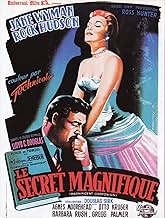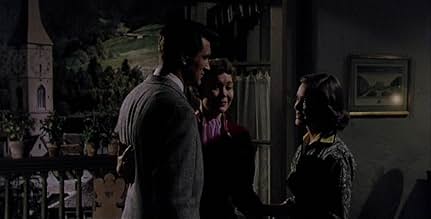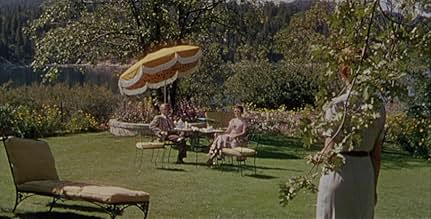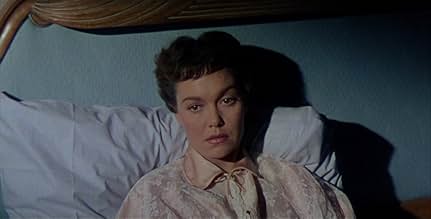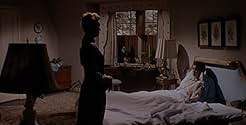VALUTAZIONE IMDb
7,0/10
8092
LA TUA VALUTAZIONE
Un ricco playboy la cui incoscienza causa inavvertitamente la morte di un importante dottore cerca di fare ammenda con la sua vedova e nel farlo si innamora di lei.Un ricco playboy la cui incoscienza causa inavvertitamente la morte di un importante dottore cerca di fare ammenda con la sua vedova e nel farlo si innamora di lei.Un ricco playboy la cui incoscienza causa inavvertitamente la morte di un importante dottore cerca di fare ammenda con la sua vedova e nel farlo si innamora di lei.
- Regia
- Sceneggiatura
- Star
- Candidato a 1 Oscar
- 2 vittorie e 1 candidatura in totale
Joseph Mell
- Dan
- (as Joe Mell)
Recensioni in evidenza
Bob Merrick (Rock Hudson) gets his commuppance and learns to be not such a reckless rich twat, with the help of a fairy godfather and falling in love with a woman he made go blind!
If you've never heard of Douglas Sirk, be prepared that this will be melodrama city. Production values are superb, though. Sirk was a very talented craftsman, as well as creating a beautiful aesthetic for these films.
Sirk made the hospital and the classic American home look as artificial and sanitised as he could: with lipstick so bright and full the lips jump off the faces, sculpted hair and good looks, everything in its right place and colours so stark it looks like a children's colour book. These locales are contrasted with a couple of other places, darkly beautiful: the scene where Rock is sitting at a bar, which starts with the rather loose and drunk looking woman leaning up against the wall, with curls of cigarette smoke and beautiful light in the background. The other is the night scene in Paris, with such exquisite light coming through the doors of the apartment.
Rock is actually pretty good in the film, and really perfect looking. I can see why Sirk picked him out - he's a Ken doll - playing the fantasy American: rich, beautiful and devil-may-care. And after this flick, he was also a star.
3/5. I liked La Habanera better, though.
If you've never heard of Douglas Sirk, be prepared that this will be melodrama city. Production values are superb, though. Sirk was a very talented craftsman, as well as creating a beautiful aesthetic for these films.
Sirk made the hospital and the classic American home look as artificial and sanitised as he could: with lipstick so bright and full the lips jump off the faces, sculpted hair and good looks, everything in its right place and colours so stark it looks like a children's colour book. These locales are contrasted with a couple of other places, darkly beautiful: the scene where Rock is sitting at a bar, which starts with the rather loose and drunk looking woman leaning up against the wall, with curls of cigarette smoke and beautiful light in the background. The other is the night scene in Paris, with such exquisite light coming through the doors of the apartment.
Rock is actually pretty good in the film, and really perfect looking. I can see why Sirk picked him out - he's a Ken doll - playing the fantasy American: rich, beautiful and devil-may-care. And after this flick, he was also a star.
3/5. I liked La Habanera better, though.
Having seen both versions of Magnificent Obsession, I have to say I prefer the remake. It's glossier and more melodramatic, which is the point of such a soapy story. However, neither movie grabs me or makes me reach for the Kleenex box. In 1936, I couldn't stand Robert Taylor, and in 1954, I didn't like Jane Wyman very much. Mild dislike wins out over an intense one, so if you're going to rent one of the versions, I'd recommend this one.
Rock Hudson is a careless playboy, and when he endangers himself in a senseless accident, he uses up valuable emergency medical equipment that could have gone to someone else-literally. Because the equipment was used to save Rock's life, a beloved doctor in a nearby hospital died. Rock feels very guilty and tries to make it up to the man's widow, Jane Wyman, but she understandably hates him and can't forgive him. Then, in another cruel twist of fate, Rock accidentally hits Jane with his car and blinds her! The movie is titled Magnificent Obsession because he makes it his mission to make up for all the wrong he's done to her, so if that story appeals to you, you'll probably like it.
It really is an interesting, melodramatic story that could have stood another remake. If you like the chemistry of the two leads, you can check out the other romance they made together, All That Heaven Allows. I would have preferred another choice for this movie's lead, someone more tragic like Jennifer Jones or Susan Hayward. Then again, Jane Wyman did play tragic figures in Johnny Belinda and The Glass Menagerie, so if you like her style, you might really like her in this.
Rock Hudson is a careless playboy, and when he endangers himself in a senseless accident, he uses up valuable emergency medical equipment that could have gone to someone else-literally. Because the equipment was used to save Rock's life, a beloved doctor in a nearby hospital died. Rock feels very guilty and tries to make it up to the man's widow, Jane Wyman, but she understandably hates him and can't forgive him. Then, in another cruel twist of fate, Rock accidentally hits Jane with his car and blinds her! The movie is titled Magnificent Obsession because he makes it his mission to make up for all the wrong he's done to her, so if that story appeals to you, you'll probably like it.
It really is an interesting, melodramatic story that could have stood another remake. If you like the chemistry of the two leads, you can check out the other romance they made together, All That Heaven Allows. I would have preferred another choice for this movie's lead, someone more tragic like Jennifer Jones or Susan Hayward. Then again, Jane Wyman did play tragic figures in Johnny Belinda and The Glass Menagerie, so if you like her style, you might really like her in this.
Douglas Sirk directed a lot of films that capitalized on the melodramas that were highly popular in the fifties. In "Magnificent Obsession" he shows why he was probably the man that was born to direct this film, as well as others of the genre. This is a remake of the film of 1935, which had been a vehicle for Irene Dunne and Robert Taylor.
Jane Wyman and Rock Hudson seemed to be unlikely candidates for playing a romantic couple in the movies. After all, Ms. Wyman was older than Mr. Hudson and clearly appeared to be in the film. The story, which is based on LLoyd Douglas novel, has a little bit of everything.
"Magnificent Obsession" proved to be a hit for its stars. In a way, it's easy to see why fans were attracted to it, with its many twists and turns and the impossible love between Helen and Dr. Bob Merrick, the playboy who becomes contrite after he causes the accident that makes Helen blind. Also in the cast the magnificent Agnes Moorehead, who has great moments in the film.
Jane Wyman and Rock Hudson seemed to be unlikely candidates for playing a romantic couple in the movies. After all, Ms. Wyman was older than Mr. Hudson and clearly appeared to be in the film. The story, which is based on LLoyd Douglas novel, has a little bit of everything.
"Magnificent Obsession" proved to be a hit for its stars. In a way, it's easy to see why fans were attracted to it, with its many twists and turns and the impossible love between Helen and Dr. Bob Merrick, the playboy who becomes contrite after he causes the accident that makes Helen blind. Also in the cast the magnificent Agnes Moorehead, who has great moments in the film.
Looking back on the abbreviated career of Douglas Sirk, "Magnificent Obsession" rises above being just another "woman's film" or "weepie". It actually serves as a notable turning point as it is the first in a string of Technicolor melodramas Sirk helmed at Universal-International, as well as one of his most popular. It also kick-started the malnourished career of Rock Hudson and sent his fame into another realm. Despite the film's lame-brained premise and endless implausibilities, Sirk takes the material and dishes out a sweet, moving drama that is a thinly disguised tale of Christianity.
Hudson stars as Bob Merrick, a millionaire playboy with no cares in the world. His lavish and self-serving lifestyle inadvertently leads to the death of a prominent local doctor, Wayne Phillips. Dr.Phillip's widow, Helen(Jane Wyman)tries to pick up the pieces of her shattered life, while at the same time resisting the advances of Bob Merrick. His persistence results in an accident in which Helen goes blind. In a convoluted and corny twist, Bob tries to redeem himself by giving selflessly to others and devoting his life to medicine to find a way to restore Helen's eyesight.
Every stereotype of every soap opera convention is used in overwhelming doses to tell the story of "Magnificent Obsession". The "alternative lifestyle" of Christianity that Bob learns is a mish-mash of psychobabble that even the most detail-oriented viewer would find boring and confusing. And the seriousness in which the actors take the material is eye-rollingly unbelievable. But this film is saved by the always-savvy direction of Douglas Sirk(who himself hated the plot)and an elegant, understated Jane Wyman who brought her own brand of sophistication to every role she played - and was Oscar-nominated for this role. Even Hudson is able to overcome his nerves in his first leading, A-list role to give a performance that is convincing. Sirk's use of reflective surfaces and a dominating color palette give this movie a look that is undeniably sheen. And Frank Skinner's classical score takes the ordinary material to an emotional level; although the choral "oohs and aahs" on the soundtrack are a bit pungent for such a quiet film. This is not Sirk's best work, but it is definitely solid enough to engage first time viewers and a must for fans of the German-bred director's work.
Hudson stars as Bob Merrick, a millionaire playboy with no cares in the world. His lavish and self-serving lifestyle inadvertently leads to the death of a prominent local doctor, Wayne Phillips. Dr.Phillip's widow, Helen(Jane Wyman)tries to pick up the pieces of her shattered life, while at the same time resisting the advances of Bob Merrick. His persistence results in an accident in which Helen goes blind. In a convoluted and corny twist, Bob tries to redeem himself by giving selflessly to others and devoting his life to medicine to find a way to restore Helen's eyesight.
Every stereotype of every soap opera convention is used in overwhelming doses to tell the story of "Magnificent Obsession". The "alternative lifestyle" of Christianity that Bob learns is a mish-mash of psychobabble that even the most detail-oriented viewer would find boring and confusing. And the seriousness in which the actors take the material is eye-rollingly unbelievable. But this film is saved by the always-savvy direction of Douglas Sirk(who himself hated the plot)and an elegant, understated Jane Wyman who brought her own brand of sophistication to every role she played - and was Oscar-nominated for this role. Even Hudson is able to overcome his nerves in his first leading, A-list role to give a performance that is convincing. Sirk's use of reflective surfaces and a dominating color palette give this movie a look that is undeniably sheen. And Frank Skinner's classical score takes the ordinary material to an emotional level; although the choral "oohs and aahs" on the soundtrack are a bit pungent for such a quiet film. This is not Sirk's best work, but it is definitely solid enough to engage first time viewers and a must for fans of the German-bred director's work.
My unashamed love for the films of Douglas Sirk may be described as an obsession, but it is to me, of course, a magnificent obsession. My attempts to influence others as to Sirk's genius have mostly failed. He's a director whose work you either get, or not. Those who view his works as camp masterpieces are very much missing the point. What is intrinsic in works of camp is the end product being appreciated in a manner that the creator had not intended. However, every camera angle of each frame, every nuance, indeed every color in every shot is totally intentional in all of Sirk's major films.
"Magnificent Obsession" is far from Sirk's best work, but it is perhaps his most important. Though he had made films in many genres, it was "All I Desire", his 1952 melodrama that paved the way for what would become his special place in cinema history. In the often ridiculed genre of so called "woman's movies", Sirk discovered there was great scope for artistic expression as well as social criticism and much more in this apparently vacuous genre. "Magnificent Obsession" is the first film in which this vision is realised.
To understand why this happened at all one must remember that Sirk was under a long term contract with Universal throughout the fifties, when they were by all accounts an inferior studio. As an European immigrant in need of work, Sirk signed to Universal, with the full understanding of the type of projects that would be offered to him. His intellectual and rich theatrical background would be put to use in clearly inferior material. When asked about this, he gave the example of how many of Shakespeare's plots are weak and uninteresting in themselves; it's the language that makes them art. Sirk was a master of cinematic language in all its aspects. The plots of his movies are often truly abysmal, but the language always pure joy to behold. "Magnificent Obsession" is a prime example of the abyss between screenplay and the cinematic language employed.
After reading the script of "Magnificent Obsession", Sirk called the plot "crazy" and did not want to make it. But as a contracted director, he had little sway with the studio heads and was persuaded, as always, to make the movie. It should be noted that he never had a bad word to say about Universal, even after he left Hollywood. He fully understood the contract he had made and simply made the best of his situation. It should also be noted that he gave Universal some of their greatest commercial successes of the decade, and created for them a star leading man, something they were in desperate need of. That star was Rock Hudson. "Magnificent Obsession" was Hudson's breakthrough film. He made eight films together with Sirk.
The magnificent obsession in question is the quest for spirituality; not exactly high on the agenda of materialistic, picture perfect, upper class American society of the fifties. Bob Merrick (Rock Hudson) is a shallow, womanizing, heavy drinking, spoiled playboy. The movie charts his journey towards spirituality. He is guided on this path by an older intellectual artist, Edward Randolph (Otto Kruger). Many critics have noted the physical similarities between Kruger and Sirk himself. It's almost irresistible to develop this notion. It is Randolph who despite Merrick's crass behavior perceives a potential for greater things and leads him towards self fulfillment.
Similarly it was Sirk who first spotted Rock Hudson's star potential. Under his guidance and direction, Hudson would in a matter of two to three years, become one the most popular actors in Hollywood. Having worked closely on eight films, it would seem absurd that Sirk was not aware of Hudson's homosexuality. This did not deter Sirk, (who himself was not gay). Moreover it fits well with his fascination for what he termed "split characters". It's the embodiment of fifties picture perfect appearance shielding a very different reality that is central to much of Sirk's work.
Edward Randolph quietly removes himself when he realises his protégé has finally found his new self. His work is done. While Hudson was no heavyweight in the acting stakes, under Sirk's direction he gave some very respectable performances, "Magnificent Obsession" amongst his best. His post Sirk career would soon take him to Doris Day territory, a far cry from the likes of "Written on the Wind", "Tarnished Angels" and "Battle Hymn".
All of Sirk's films are worth taking a close look at, particularly from "Magnificent Obsession" onwards. There are a handful of directors who so well grasped the possibilities of film making and possessed the know how in using the many elements that make up this art form.
"Magnificent Obsession" is far from Sirk's best work, but it is perhaps his most important. Though he had made films in many genres, it was "All I Desire", his 1952 melodrama that paved the way for what would become his special place in cinema history. In the often ridiculed genre of so called "woman's movies", Sirk discovered there was great scope for artistic expression as well as social criticism and much more in this apparently vacuous genre. "Magnificent Obsession" is the first film in which this vision is realised.
To understand why this happened at all one must remember that Sirk was under a long term contract with Universal throughout the fifties, when they were by all accounts an inferior studio. As an European immigrant in need of work, Sirk signed to Universal, with the full understanding of the type of projects that would be offered to him. His intellectual and rich theatrical background would be put to use in clearly inferior material. When asked about this, he gave the example of how many of Shakespeare's plots are weak and uninteresting in themselves; it's the language that makes them art. Sirk was a master of cinematic language in all its aspects. The plots of his movies are often truly abysmal, but the language always pure joy to behold. "Magnificent Obsession" is a prime example of the abyss between screenplay and the cinematic language employed.
After reading the script of "Magnificent Obsession", Sirk called the plot "crazy" and did not want to make it. But as a contracted director, he had little sway with the studio heads and was persuaded, as always, to make the movie. It should be noted that he never had a bad word to say about Universal, even after he left Hollywood. He fully understood the contract he had made and simply made the best of his situation. It should also be noted that he gave Universal some of their greatest commercial successes of the decade, and created for them a star leading man, something they were in desperate need of. That star was Rock Hudson. "Magnificent Obsession" was Hudson's breakthrough film. He made eight films together with Sirk.
The magnificent obsession in question is the quest for spirituality; not exactly high on the agenda of materialistic, picture perfect, upper class American society of the fifties. Bob Merrick (Rock Hudson) is a shallow, womanizing, heavy drinking, spoiled playboy. The movie charts his journey towards spirituality. He is guided on this path by an older intellectual artist, Edward Randolph (Otto Kruger). Many critics have noted the physical similarities between Kruger and Sirk himself. It's almost irresistible to develop this notion. It is Randolph who despite Merrick's crass behavior perceives a potential for greater things and leads him towards self fulfillment.
Similarly it was Sirk who first spotted Rock Hudson's star potential. Under his guidance and direction, Hudson would in a matter of two to three years, become one the most popular actors in Hollywood. Having worked closely on eight films, it would seem absurd that Sirk was not aware of Hudson's homosexuality. This did not deter Sirk, (who himself was not gay). Moreover it fits well with his fascination for what he termed "split characters". It's the embodiment of fifties picture perfect appearance shielding a very different reality that is central to much of Sirk's work.
Edward Randolph quietly removes himself when he realises his protégé has finally found his new self. His work is done. While Hudson was no heavyweight in the acting stakes, under Sirk's direction he gave some very respectable performances, "Magnificent Obsession" amongst his best. His post Sirk career would soon take him to Doris Day territory, a far cry from the likes of "Written on the Wind", "Tarnished Angels" and "Battle Hymn".
All of Sirk's films are worth taking a close look at, particularly from "Magnificent Obsession" onwards. There are a handful of directors who so well grasped the possibilities of film making and possessed the know how in using the many elements that make up this art form.
Lo sapevi?
- QuizThis film was an early starring role for Rock Hudson, and, according to Jane Wyman, he was very nervous. Some of his scenes had to be reshot thirty or forty times, but Wyman never said a word. Reportedly, years later at a party, Hudson ran into Wyman and said, "You were nice to me when you didn't have to be, and I want you to know that I thank you and love you for it."
- BlooperAt the accident scene, as the taxicab door closes, it is seen that there is no damage to it.
- Citazioni
[last lines]
Edward Randolph: Once you find the way, you'll be bound. It will obsess you. but believe me, it will be a magnificent obsession.
- ConnessioniFeatured in Behind the Mirror: A Profile of Douglas Sirk (1979)
- Colonne sonoreConsolations, S. 172 No. 3 in D flat major - Lento, placido
Written by Franz Liszt
I più visti
Accedi per valutare e creare un elenco di titoli salvati per ottenere consigli personalizzati
- How long is Magnificent Obsession?Powered by Alexa
Dettagli
- Data di uscita
- Paese di origine
- Lingue
- Celebre anche come
- Magnificent Obsession
- Luoghi delle riprese
- Azienda produttrice
- Vedi altri crediti dell’azienda su IMDbPro
- Tempo di esecuzione1 ora 48 minuti
- Colore
- Proporzioni
- 2.00 : 1
Contribuisci a questa pagina
Suggerisci una modifica o aggiungi i contenuti mancanti

Divario superiore
By what name was Magnifica ossessione (1954) officially released in India in English?
Rispondi


